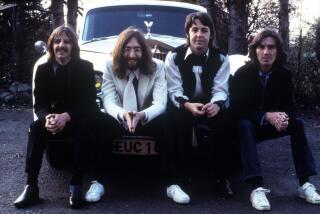Beatles get back to U.S. sound
- Share via
America, meet the Beatles. Again.
For the first time in the CD era, Capitol Records is issuing the Fab Four’s albums as they originally appeared and sounded in the United States. The first batch will be bundled in a four-CD set and titled “The Capitol Albums, Vol. 1,” to be released Nov. 16. It is expected to retail for about $70 and will contain “Meet the Beatles,” “The Beatles’ Second Album,” “Something New” and “Beatles ‘65,” each CD in a cover replicating the original artwork, plus a 48-page booklet of photos, news clippings and other artifacts from the period.
For the record:
12:00 a.m. Oct. 15, 2004 For The Record
Los Angeles Times Friday October 15, 2004 Home Edition Main News Part A Page 2 National Desk 2 inches; 71 words Type of Material: Correction
Beatles albums -- An article in Wednesday’s Calendar section about Capitol Records’ release on CD of the U.S. configurations of early Beatles LPs said Capitol could not have mirrored the band’s album “With the Beatles” because Vee-Jay Records held the U.S. rights to some of the songs. Vee-Jay held U.S. rights to material from the group’s first British album, “Please Please Me,” not “With the Beatles,” the group’s second British album.
The group’s entire catalog has been available on CD since 1987, but when those came out, Capitol and its parent, EMI Records, standardized them according to the way they first came out in England.
For the first few years of the Beatles’ career, however, U.S. fans got strikingly different versions of their albums. It wasn’t until the 1967 release of “Sgt. Pepper’s Lonely Hearts Club Band” that a Beatles album appeared the same on both sides of the Atlantic Ocean.
“Since I got to Capitol 3 1/2 years ago, I’ve thought it would be great to be able to have those records to listen to again,” Capitol Records President and CEO Andy Slater said Tuesday. “I remember as a kid looking at those records and listening to that sequence of songs.... For better or worse, that’s the way I remember those records.”
So do millions of U.S. Beatlemaniacs. Not only were the album titles different -- “With the Beatles” became “Meet the Beatles” here -- but the song selection and sequencing were markedly different than the U.K. versions
Additionally, recordings were issued here in stereo (some in simulated stereo and some with reverberation added). Each of the new CDs will include both the American stereo versions and the original British mono mixes.
“I remember pretty distinctly listening in the basement of my cousin’s house to ‘Beatles ‘65’ and hearing ‘No Reply’ followed by ‘I’m a Loser’ and then ‘Baby’s in Black,’ ” Slater said. “I can even remember hearing ‘I Saw Her Standing There,’ and the voices coming out of the right speaker.... If nostalgia is the intoxicant of the Baby Boom generation, then the versions that are currently available are not as intoxicating for me to listen to.”
The alterations, originally characterized as “Americanizations,” were long a sore point for the Beatles and their longtime producer, George Martin, who complained that Capitol executives at the time were more interested in making as much money as possible than presenting the music as the band intended.
Beatles fans have argued for decades over Capitol’s handling of the group’s catalog, because the U.S. albums included fewer songs than the British versions, allowing Capitol to release 10 albums from 1964 to 1966 while just seven had appeared in England.
The decision to alter the albums for U.S. release is commonly traced to the man then in charge of artists and repertoire (A&R;) for the label, Dave Dexter, who, ironically, had declined to sign the group in 1963.
“These are the choices made by the man who turned them down four times because he thought they were hopeless and had no future in America whatsoever,” says British-born Beatles historian Martin Lewis. “And then he had the chutzpah to put his name on as producer [of the U.S. releases] after he was overruled about signing them by the president of Capitol, Alan Livingston.”
Slater, however, says “I don’t think it was a matter of anybody A&R-ing; their records here. They literally delivered dozens of masters.... So in 1964, when Capitol decided to put the first record out, they had dozens of songs to sift through and make a record out of.”
Adds Lewis: “Even if Capitol had wanted to, they couldn’t have mirrored the ‘With the Beatles’ album in the U.S.,” in large part because Vee Jay held the U.S. rights to several of the songs on that British release.
Instead, “Meet the Beatles” included “I Want to Hold Your Hand,” “I Saw Her Standing There” and “This Boy,” which had not appeared on “With the Beatles.” Meanwhile, the group’s covers of Chuck Berry’s “Roll Over Beethoven,” the Marvelettes’ “Please Mr. Postman,” the Miracles’ “You’ve Really Got a Hold On Me” and Barrett Strong’s “Money (That’s What I Want)” on “With the Beatles” were left off “Meet the Beatles.”
In 1987, Capitol and EMI, at the behest of the surviving Beatles and Martin, agreed to issue the albums according to their original British configurations when they were released for the first time on CD.
Slater said it hasn’t been determined how or when the label will issue the U.S. versions of the other albums that differ from the British catalog: “The Early Beatles,” “Beatles VI,” “Help!,” “Rubber Soul,” “ ‘Yesterday’ ... and Today,” “Revolver” and “Hey Jude,” a 1970 U.S.-only compilation of various singles that had never previously appeared on a U.S. album.
More to Read
The biggest entertainment stories
Get our big stories about Hollywood, film, television, music, arts, culture and more right in your inbox as soon as they publish.
You may occasionally receive promotional content from the Los Angeles Times.









